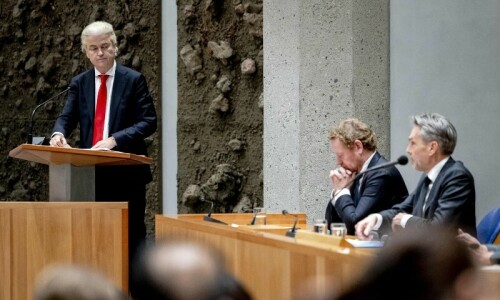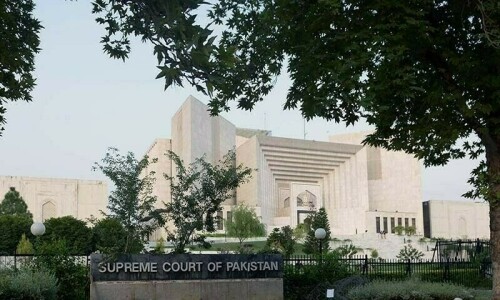SYDNEY: Prime Minister Kevin Rudd on Saturday conceded defeat to conservative challenger Tony Abbott in Australian elections and said he will step down as Labor leader as voters punished the party for internal warfare.
Some 100 minutes after the polls closed, Rudd mounted the stage in a function room at the Gabba cricket ground in Brisbane to wish his rival well in the “high strain” lifestyle that comes with the leadership.
“A short time again I telephoned Tony Abbott to concede defeat at this national election,” he said to cheering supporters. “As prime minister of Australia, I wish him well in the high office of prime minister of this country.”
He also announced he will quit as party leader, saying it was time for a change. “I will not be re-contesting the leadership of the parliamentary Labor Party. The Australian people I believe deserve a fresh start with our leadership.”
With 83 per cent of the votes counted, the Australian Electoral Commission showed Abbott’s Liberal/National coalition was leading in 88 seats in the House of Representatives, to Labor’s 56.
Abbott, a former trainee Catholic priest, boxing enthusiast and monarchist, capitalised on the infighting that saw Rudd oust Julia Gillard as Labor leader in June, three years after she did the same to him.
Best known as a political hard man of the Liberal Party, unafraid of speaking his mind and occasionally tripping up on a gaffe, he has rebuilt his image and ran what was widely seen as a disciplined election campaign.
He made a paid parental leave scheme his “signature” policy, while pledging to scrap the carbon tax and make billions of dollars of savings to bring debt down.
“Overall whatever success we are able to gain in this election is due to Tony Abbott's dedication and determination and commitment to hold a government to account and to present a clear alternative of focused, united, competent government,” his deputy Julie Bishop said Saturday.
Rudd said Labor had “fought the good fight”.
“Tonight is the time to unite as the great Australian nation,” he said. “Because whatever our politics may be we are all first and foremost Australian and the things that unite us are more powerful than the things that divide us, which is why the world marvels at Australia.”
Health Minister Tanya Plibersek admitted Labor had only itself to blame for defeat. “The clear take-out from this definitely is that disunity is death and we are not disciplined enough,” she said. “I don’t think the division or the pain was justified at any stage.”
Former Labor prime minister Bob Hawke, who won four successive elections in the 1980s and 90s, said personality politics had been allowed to overtake the party's message and policies.
“The personal manipulations and pursuits of interest have dominated more than they should and in the process the concentration on values has slipped,” he told Sky. “I really believe this was an election that was lost by the government rather than one that was won by the opposition.”
Rudd struggled for traction after toppling Gillard, Australia’s first female prime minister, in a bitter party room coup just weeks before calling the election.
He earlier cast his ballot in a Brisbane church, where he was met by a group of noisy refugee advocates who yelled at him about Labor's mandatory detention of asylum-seekers who arrive by boat.
A relaxed Abbott, 55, running as opposition leader in his second election, said while casting his vote at Freshwater Surf Club in Sydney, where he voted with wife Margie and three adult daughters, that he was ready to assume the leadership.
“Inevitably, all candidates are nervous but I am confident I am ready and my team is ready,” he told reporters
Rudd, also 55, campaigned on his administration’s success in keeping Australia out of a recession during the global financial crisis.
He also promised to scrap the carbon tax brought in by Labor after the 2010 election and move to a carbon emissions trading scheme by July 2014.
Other key policies included a plan to introduce a bill in parliament to legalise gay marriage and the adoption of tough measures to halt asylum-seeker boats.














































